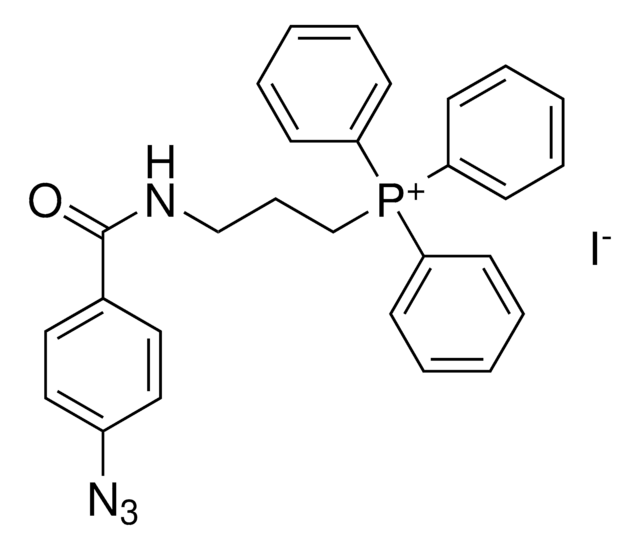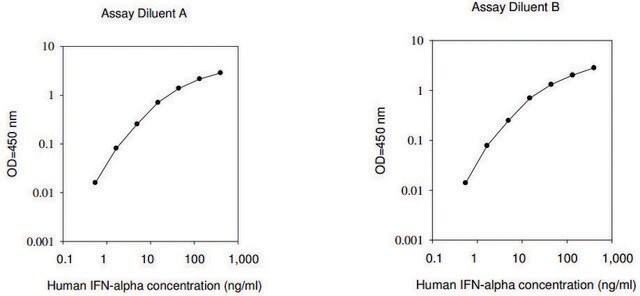おすすめの製品
由来生物
human
リコンビナント
expressed in E. coli
アッセイ
≥98% (HPLC)
≥98% (SDS-PAGE)
形状
lyophilized
有効性
≤0.01 ng/mL ED50
分子量
19.9 kDa
包装
pkg of 100 μg
テクニック
cell culture | mammalian: suitable
不純物
<0.1 EU/μg endotoxin, tested
色
white to off-white
UniProtアクセッション番号
輸送温度
wet ice
保管温度
−20°C
遺伝子情報
human ... IFNW1(3467)
関連するカテゴリー
詳細
IFN-ωは、ウイルスが感染した白血球によって誘導されうるI型インターフェロンです。I型インターフェロンファミリーのメンバーは、IFN-α、IFN-β、IFN-ωを誘導し、IFNAR-1/IFNAR-2受容体複合体を通じてシグナルを伝達し、抗ウイルス活性と抗増殖活性を発現します。IFN-αと約75%の配列相同性を示し、2つの保存されたジスルフィド結合を含み、完全な生物活性にとって必要です。組み換えヒトIFN-ωは、173個のアミノ酸残基からなる19.9 kDaのタンパク質です。
生物化学的/生理学的作用
IFN-ωは、ウイルスが感染した白血球によって誘導されうるI型インターフェロンです。I型インターフェロンファミリーのメンバーは、IFN-α、IFN-β、IFN-ωを誘導し、IFNAR-1/IFNAR-2受容体複合体を通じてシグナルを伝達し、抗ウイルス活性と抗増殖活性を発現します。IFN-αと約75%の配列相同性を示し、2つの保存されたジスルフィド結合を含み、完全な生物活性にとって必要です。組み換えヒトIFN-ωは、173個のアミノ酸残基からなる19.9 kDaのタンパク質です。
シーケンス
MCDLPQNHGL LSRNTLVLLH QMRRISPFLC LKDRRDFRFP QEMVKGSQLQ KAHVMSVLHE MLQQIFSLFH TERSSAAWNM TLLDQLHTGL HQQLQHLETC LLQVVGEGES AGAISSPALT LRRYFQGIRV YLKEKKYSDC AWEVVRMEIM KSLFLSTNMQ ERLRSKDRDL GSS
物理的形状
凍結乾燥品(添加物不含)。
再構成
バイアルは、開封前に遠心してください。水で濃度1.0 mg/mLに復元してください。ボルテックスは行なわないでください。水溶液は2~8°Cで最長1週間保存できます。長期保存には、担体タンパク質(0.1% BSAなど)含有バッファーでさらに希釈し、1回の使用量ずつに分注して-20~-80°Cで保存することを推奨します。
保管分類コード
11 - Combustible Solids
WGK
WGK 3
引火点(°F)
Not applicable
引火点(℃)
Not applicable
試験成績書(COA)
製品のロット番号・バッチ番号を入力して、試験成績書(COA) を検索できます。ロット番号・バッチ番号は、製品ラベルに「Lot」または「Batch」に続いて記載されています。
Hassan Abolhassani et al.
Journal of clinical immunology, 42(3), 471-483 (2022-01-30)
Inborn errors of immunity (IEI) and autoantibodies to type I interferons (IFNs) underlie critical COVID-19 pneumonia in at least 15% of the patients, while the causes of multisystem inflammatory syndrome in children (MIS-C) remain elusive. To detect causal genetic variants
Angelique Chauvineau-Grenier et al.
Research square (2021-10-07)
Recent studies reported the presence of pre-existing autoantibodies (auto-Abs) neutralizing type I interferons (IFNs) in at least 15% of patients with critical or severe COVID-19 pneumonia. In one study, these auto-Abs were found in almost 20% of deceased patients across
Hassan Abolhassani et al.
Journal of clinical immunology (2021-10-24)
Coronavirus disease 2019 (COVID-19) exhibits a wide spectrum of clinical manifestations, ranging from asymptomatic to critical conditions. Understanding the mechanism underlying life-threatening COVID-19 is instrumental for disease prevention and treatment in individuals with a high risk. We aimed to identify
Nikaïa Smith et al.
Nature communications, 13(1), 7254-7254 (2022-11-27)
Host immunity to infection with SARS-CoV-2 is highly variable, dictating diverse clinical outcomes ranging from asymptomatic to severe disease and death. We previously reported reduced type I interferon in severe COVID-19 patients preceded clinical worsening. Further studies identified genetic mutations
Romain Arrestier et al.
Annals of intensive care, 12(1), 121-121 (2023-01-01)
Auto-antibodies (auto-Abs) neutralizing type I interferons (IFN) have been found in about 15% of critical cases COVID-19 pneumonia and less than 1% of mild or asymptomatic cases. Determining whether auto-Abs influence presentation and outcome of critically ill COVID-19 patients could
ライフサイエンス、有機合成、材料科学、クロマトグラフィー、分析など、あらゆる分野の研究に経験のあるメンバーがおります。.
製品に関するお問い合わせはこちら(テクニカルサービス)



